★★½
Lady Snowblood
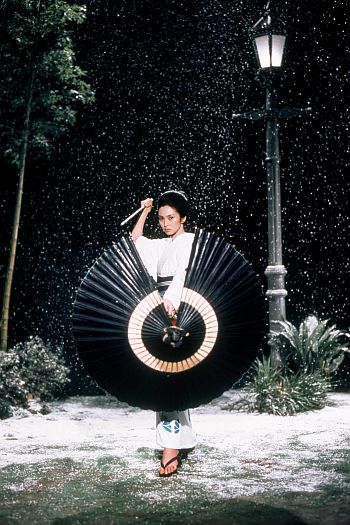 I’ll be honest: I was disappointed. I’d been looking forward to seeing this for a long while, but when we finally cranked it up on Monday, found it pretty dull. Truth be told, Chris was giving it loud Z’s by the end of the film, and I spent a few minutes closing my eyes and just listening to the dialogue. Which, since it was in Japanese, isn’t a good sign either. This was a surprise. A lot of people, whose views I generally respect, really like it, such as mandiapple.com, who called it “nothing short of a masterpiece.” Reading that, I had to check they were reviewing the same film. Because, personally, while its influence on Kill Bill is undeniable, that is a far more effective piece of work.
I’ll be honest: I was disappointed. I’d been looking forward to seeing this for a long while, but when we finally cranked it up on Monday, found it pretty dull. Truth be told, Chris was giving it loud Z’s by the end of the film, and I spent a few minutes closing my eyes and just listening to the dialogue. Which, since it was in Japanese, isn’t a good sign either. This was a surprise. A lot of people, whose views I generally respect, really like it, such as mandiapple.com, who called it “nothing short of a masterpiece.” Reading that, I had to check they were reviewing the same film. Because, personally, while its influence on Kill Bill is undeniable, that is a far more effective piece of work.
The plot in both is needlessly-convoluted, but it has much more of a negative impact here. Here is the story, in chronological order. In late 19th-century Japan, a mother sees her husband and young son slaughtered by a group of four con-artists; she is kidnapped and raped over a period of several days before being abandoned. She vows revenge, but is arrested after killing only one of the four, and sent to prison for life. There, she has a baby daughter, Yuki, spawned for the sole purpose of continuing the revenge. After the mother dies in jail, Yuki is released with another prisoner, and begins her training under a tough Buddhist priest (Nishimura). When she reaches her twentieth birthday, she leaves, to start her mission.
The problems here are multiple, not least that Yuki is just too cold. She might as well be an automaton, as she progresses on her vengeance, showing no emotion or feeling, and it’s hard to feel empathy for her. Yes, she is supposed to be a cold-hearted killing machine, but the performance here is devoid of all humanity. There’s nothing personal here either. Yuki is not the victim; the events in question occurred before she was even conceived, giving her no direct stake in proceedings – she is simply a tool, wielded from beyond the grave by a mother she never really knew. Contrast Kill Bill, where the Bride sees her husband-to-be slaughtered at the altar. As motivation, it’s far superior and resonates much more with the audience.
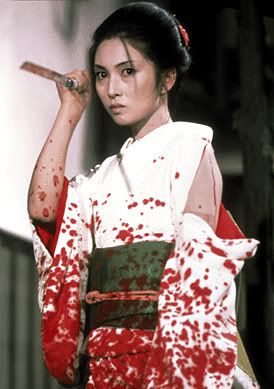 Then there’s the action, which is second-rate at best. It may have seemed cutting-edge when the film was released in 1973. Approaching forty years later… Not so much. There’s little sense that anyone – good or bad – has true sword skills, and the battles are largely brief and perfunctory. Admittedly, the arterial spray is enthusiastic – clearly the high blood-pressure epidemic affecting Japan is not a new phenomena – and looks very pretty on the snow backdrop which is frequently used. However, that can only go some way to overcoming the flaws in the characterization: one suspects the original manga, by Kazuo Koike (who also did Lone Wolf and Cub), perhaps had more room to be better developed in this area. And while we’re at it, what’s with the anachronistic jazz soundtrack, dating from a good half-century after this is set? Any sense of period atmosphere is completely destroyed, every time it cranks up.
Then there’s the action, which is second-rate at best. It may have seemed cutting-edge when the film was released in 1973. Approaching forty years later… Not so much. There’s little sense that anyone – good or bad – has true sword skills, and the battles are largely brief and perfunctory. Admittedly, the arterial spray is enthusiastic – clearly the high blood-pressure epidemic affecting Japan is not a new phenomena – and looks very pretty on the snow backdrop which is frequently used. However, that can only go some way to overcoming the flaws in the characterization: one suspects the original manga, by Kazuo Koike (who also did Lone Wolf and Cub), perhaps had more room to be better developed in this area. And while we’re at it, what’s with the anachronistic jazz soundtrack, dating from a good half-century after this is set? Any sense of period atmosphere is completely destroyed, every time it cranks up.
What works is mostly the visual style, and it’s soundly put together from a technical aspect. Kaji, who plays the adult Yuki, is also solid enough, though was probably better – even if she said less! – in the Female Convict Scorpion series [I must get round to reviewing the excellent Jailhouse 41 here some time, though it won’t be till after we move house in October, and the DVD re-surfaces…]. I also liked the chaste purity here: Yuki doesn’t have any real relationships at all – she lives purely for revenge. However, I feel much the same way about this, that I did about the original Night of the Living Dead. While it certainly deserves to be respected for its influential place in the history of the genre, it feels as if the elements seen here have been revisited with greater success, by those who followed in its foot-steps.
Dir: Toshiya Fujita
Star: Meiko Kaji, Ko Nishimura, Toshio Kurosawa, Masaaki Daimon
★★
Lady Snowblood 2: Love Song of Vengeance
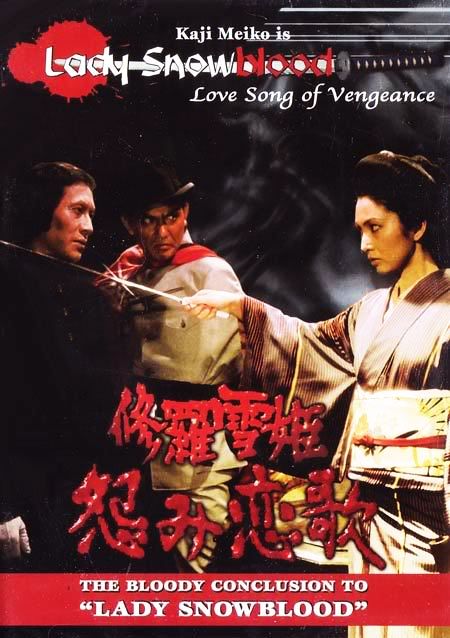 I was hoping that the second film would show me why this series has such a solid reputation, but was even more disappointed by the sequel than the original. There’s a striking opening, where Yuki basically walks out of an ambush, hardly bothering even to pay attention to the men circling her – except to slaughter them. Unfortunately, it’s pretty much downhill from there, with proceedings getting badly bogged down in even more of the political shenanigans that we saw in part one. Yuki is arrested and sentenced to death for her 37(!) murders, but is rescued by the chief of the secret police, Kikui Seishiro (Kishida), who sends her on a mission against nihilist Ransui Tokunaga (Itami), perceived as a threat to the order of things.
I was hoping that the second film would show me why this series has such a solid reputation, but was even more disappointed by the sequel than the original. There’s a striking opening, where Yuki basically walks out of an ambush, hardly bothering even to pay attention to the men circling her – except to slaughter them. Unfortunately, it’s pretty much downhill from there, with proceedings getting badly bogged down in even more of the political shenanigans that we saw in part one. Yuki is arrested and sentenced to death for her 37(!) murders, but is rescued by the chief of the secret police, Kikui Seishiro (Kishida), who sends her on a mission against nihilist Ransui Tokunaga (Itami), perceived as a threat to the order of things.
That’s because Tokanaga and his wife are in possession of a document that could seriously embarrass the government, by proving their involvement in the deaths of Tokunaga’s partners. When Yuki discovers this, she switches sides, though Tokunaga is arrested, tortured and, when he fails to give up the document’s location, injected with bubonic plague [interestingly, this is a decade before the biological weapons work of Unit 731 during WW2 became public knowledge in Japan] and dumped in the slums as a warning to others. Yuki teams up with Tokunaga’s estranged brother, and sets out to take revenge on the government forces responsible for his death.
This is set just after the Russo-Japanese war of 1905, and I’ve a feeling is meant in some way to parallel the political situation of the 1970’s. However, all such sentiment is entirely wasted on Western viewers watching it almost forty years after it was made. If you’re looking at this as an action movie, it plays out in a manner best described as turgid, with very sporadic action, to such an extent that it hardly qualifies as such at all – if it weren’t for the original, I doubt I’d be covering it here. Even the arterial gushiness seems to be less unenthusiastic and sprayful than previously.
On the other hand, Kaji’s portrayal is more emotionally-disengaged this time, and it’s even harder to develop sympathy for a character engaged in some kind of obscure political activism, rather than personal revenge. It’s what perhaps makes this one’s closest cousin V For Vendetta, with samurai swords. And, in case you were wondering, that is not meant to be much of an endorsement. I’d say you are far better off watching the futuristic remake, The Princess Blade or even the better entries in the Crimson Bat series than either of these films, and given my high hopes coming into these, based on their reputation, that’s extremely disappointing.
Dir: Toshiya Fujita
Star: Meiko Kaji, Juzo Itami, Kazuko Yoshiyuki, Shin Kishida
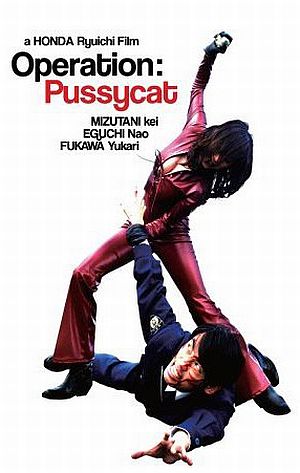 Faster, Pussycat is one of the icons of the action heroine genre, literally entire decades ahead of its time. This Japanese version uses a lot of the same elements, starting with a trio of go-go girls on the lam, under their macho leader. They stumble across a wheelchair-bound man and his muscular if taciturn companion, who appears to be stashing a large sum of money somewhere on the premises. If only they could find it… There’s also an innocent who gets entangled in the web of deceit and counter-deceit – in the original, it was because she witnessed them kill her boyfriend, while in this case, it’s after she apparently witnesses the three beat up a policeman, who stopped them for speeding, and discovered the dead body stashed in the back of their pick-up truck.
Faster, Pussycat is one of the icons of the action heroine genre, literally entire decades ahead of its time. This Japanese version uses a lot of the same elements, starting with a trio of go-go girls on the lam, under their macho leader. They stumble across a wheelchair-bound man and his muscular if taciturn companion, who appears to be stashing a large sum of money somewhere on the premises. If only they could find it… There’s also an innocent who gets entangled in the web of deceit and counter-deceit – in the original, it was because she witnessed them kill her boyfriend, while in this case, it’s after she apparently witnesses the three beat up a policeman, who stopped them for speeding, and discovered the dead body stashed in the back of their pick-up truck.




 A loosely-related sequel to Oshii’s last live-action film, Avalon, this is similarly set in a VR world, and muses on the relationship between real life and game life. This one is a lot less populated; there are only four people in it, roaming a desert landscape, with the targets being giant sandworms (think Dune) and the “boss” Madara, the mother of all sandworms, whom the game helpfully informs contestants, cannot be killed single-handed. The four get together to launch an attack on it, having agreed to split the game reward equally. Is that quite how things are going to turn out?
A loosely-related sequel to Oshii’s last live-action film, Avalon, this is similarly set in a VR world, and muses on the relationship between real life and game life. This one is a lot less populated; there are only four people in it, roaming a desert landscape, with the targets being giant sandworms (think Dune) and the “boss” Madara, the mother of all sandworms, whom the game helpfully informs contestants, cannot be killed single-handed. The four get together to launch an attack on it, having agreed to split the game reward equally. Is that quite how things are going to turn out? Miike has provided some of our favorite Japanese films of all-time, including Audition, Ichi the Killer and The Bird People of China, but this entry in his prolific output has to count as a misfire, being nowhere near as interesting as it sounds. Heroine Jun (Sakuraba) is abroad when her entire family is killed by Yakuza: three years later, after working as an FBI agent (!) and continuing her karate education, she returns home, to track down those responsible. She does this by going undercover in a pro wrestling promotion (!!), on the basis they can tour the country without suspicion, letting her investigate as her wrestling alter-ego, Silver. However, she’s not the only one on the hunt, with a dart-using assassin contracted to stop Jun.
Miike has provided some of our favorite Japanese films of all-time, including Audition, Ichi the Killer and The Bird People of China, but this entry in his prolific output has to count as a misfire, being nowhere near as interesting as it sounds. Heroine Jun (Sakuraba) is abroad when her entire family is killed by Yakuza: three years later, after working as an FBI agent (!) and continuing her karate education, she returns home, to track down those responsible. She does this by going undercover in a pro wrestling promotion (!!), on the basis they can tour the country without suspicion, letting her investigate as her wrestling alter-ego, Silver. However, she’s not the only one on the hunt, with a dart-using assassin contracted to stop Jun. This unofficial spin-off from the Zatoichi series had us wondering if there’s a Japanese studio version of The Asylum out there – the people who specialize in knockoffs of popular films, including such classics as Snakes on a Train and Sunday School Musical. We’ll cut the makers of this some slack, since we’re of the opinion that all action films are improved with a heroine in the lead. That’s the main switch here: Zatoichi becomes Ichi (Ayase), a blind swordswoman and entertainer, who is roaming the country in search of the man she believes is her father. She is quite capable of taking care of herself, but the resulting trail of bodies is blamed on travelling companion Tomo Fujihira (Ôsawa), who becomes bodyguard to a town under assault from a gang, led by Banki (Nakamura). Unfortunately, since he accidentally blinded his mother, Tomo is unable to pull his sword from its scabbard, and the Banki gang are ready to wreak revenge on him for the members killed by Ichi.
This unofficial spin-off from the Zatoichi series had us wondering if there’s a Japanese studio version of The Asylum out there – the people who specialize in knockoffs of popular films, including such classics as Snakes on a Train and Sunday School Musical. We’ll cut the makers of this some slack, since we’re of the opinion that all action films are improved with a heroine in the lead. That’s the main switch here: Zatoichi becomes Ichi (Ayase), a blind swordswoman and entertainer, who is roaming the country in search of the man she believes is her father. She is quite capable of taking care of herself, but the resulting trail of bodies is blamed on travelling companion Tomo Fujihira (Ôsawa), who becomes bodyguard to a town under assault from a gang, led by Banki (Nakamura). Unfortunately, since he accidentally blinded his mother, Tomo is unable to pull his sword from its scabbard, and the Banki gang are ready to wreak revenge on him for the members killed by Ichi.
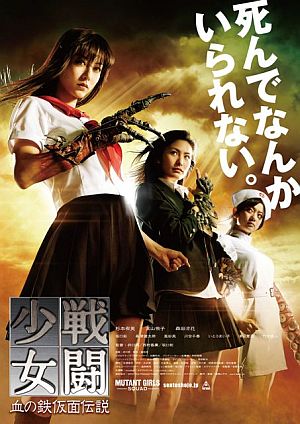 It makes sense that this stems from a drunken agreement between the three co-directors at a film festival, because this is the sort of film you would only make under inebriated terms, and it’s probably true to say that drunk is the best way to watch this. That’s not a bad thing per se, just that its loopy sensibilities and over-the-top antics would seem to go
It makes sense that this stems from a drunken agreement between the three co-directors at a film festival, because this is the sort of film you would only make under inebriated terms, and it’s probably true to say that drunk is the best way to watch this. That’s not a bad thing per se, just that its loopy sensibilities and over-the-top antics would seem to go 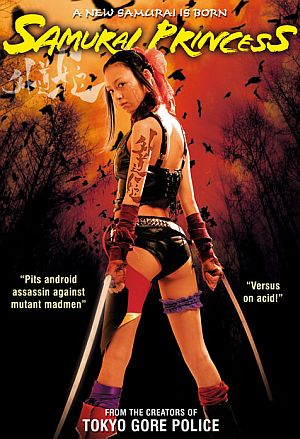 Ok, “dull” is perhaps not quite the word, but Chris voted on this one with her closed eyelids and heavy breathing, and I was struggling to avoid joining her, despite some impressive ideas. It’s set in the Forest of Infinity, a strange locale where past, present and future all seem to merge. Hence, you’ve got renegades with samurai swords and Buddhist nuns and a party of a dozen young women whose paths cross with the former, resulting in the rape and death of 11. The un-named survivor (Kishi) is rescued by a scientist who creates mecha – cyborgs – and he uses the organs of her friends as a core to rebuild her, with the nun adding their 11 souls. The new super-powered samurai princess goes after the killers, and then Red Dragon and Butterfly, who instigated the murders in the name of what they call “art.”
Ok, “dull” is perhaps not quite the word, but Chris voted on this one with her closed eyelids and heavy breathing, and I was struggling to avoid joining her, despite some impressive ideas. It’s set in the Forest of Infinity, a strange locale where past, present and future all seem to merge. Hence, you’ve got renegades with samurai swords and Buddhist nuns and a party of a dozen young women whose paths cross with the former, resulting in the rape and death of 11. The un-named survivor (Kishi) is rescued by a scientist who creates mecha – cyborgs – and he uses the organs of her friends as a core to rebuild her, with the nun adding their 11 souls. The new super-powered samurai princess goes after the killers, and then Red Dragon and Butterfly, who instigated the murders in the name of what they call “art.” Lili is a devotee of Sayama Hashinryu, a deadly form of swordsmanship passed down from woman to woman. She goes through the initiation rite, which involves being blindfolded and given a drink which knocks her unconscious. She comes to, about three hundred years in the past, in feudal Japan, naked. When she gathers her senses, she rescues a local village-girl from some ninjas, but to cut a long story short, discovers in the process that when Lili exposes her breasts, they emit a pinkish glow, and she becomes far better at swordplay. Turns out the poor villagers are suffering extortion from the evil Lady Okini (Asa), so Lili turns into the Magnificent One [or Magnificent Two, if you know what I mean, and I think you do], while also falling for Hikoichi (Matsuda), the brother of the girl she rescued. However, it turns out that Lili is not the only one in possession of a supernatural bosom; Lady Okini is also so equipped. Battle cleavages are thus drawn…
Lili is a devotee of Sayama Hashinryu, a deadly form of swordsmanship passed down from woman to woman. She goes through the initiation rite, which involves being blindfolded and given a drink which knocks her unconscious. She comes to, about three hundred years in the past, in feudal Japan, naked. When she gathers her senses, she rescues a local village-girl from some ninjas, but to cut a long story short, discovers in the process that when Lili exposes her breasts, they emit a pinkish glow, and she becomes far better at swordplay. Turns out the poor villagers are suffering extortion from the evil Lady Okini (Asa), so Lili turns into the Magnificent One [or Magnificent Two, if you know what I mean, and I think you do], while also falling for Hikoichi (Matsuda), the brother of the girl she rescued. However, it turns out that Lili is not the only one in possession of a supernatural bosom; Lady Okini is also so equipped. Battle cleavages are thus drawn… I’ll be honest: I was disappointed. I’d been looking forward to seeing this for a long while, but when we finally cranked it up on Monday, found it pretty dull. Truth be told, Chris was giving it loud Z’s by the end of the film, and I spent a few minutes closing my eyes and just listening to the dialogue. Which, since it was in Japanese, isn’t a good sign either. This was a surprise. A lot of people, whose views I generally respect, really like it, such as
I’ll be honest: I was disappointed. I’d been looking forward to seeing this for a long while, but when we finally cranked it up on Monday, found it pretty dull. Truth be told, Chris was giving it loud Z’s by the end of the film, and I spent a few minutes closing my eyes and just listening to the dialogue. Which, since it was in Japanese, isn’t a good sign either. This was a surprise. A lot of people, whose views I generally respect, really like it, such as  Then there’s the action, which is second-rate at best. It may have seemed cutting-edge when the film was released in 1973. Approaching forty years later… Not so much. There’s little sense that anyone – good or bad – has true sword skills, and the battles are largely brief and perfunctory. Admittedly, the arterial spray is enthusiastic – clearly the high blood-pressure epidemic affecting Japan is not a new phenomena – and looks very pretty on the snow backdrop which is frequently used. However, that can only go some way to overcoming the flaws in the characterization: one suspects the original manga, by Kazuo Koike (who also did Lone Wolf and Cub), perhaps had more room to be better developed in this area. And while we’re at it, what’s with the anachronistic jazz soundtrack, dating from a good half-century after this is set? Any sense of period atmosphere is completely destroyed, every time it cranks up.
Then there’s the action, which is second-rate at best. It may have seemed cutting-edge when the film was released in 1973. Approaching forty years later… Not so much. There’s little sense that anyone – good or bad – has true sword skills, and the battles are largely brief and perfunctory. Admittedly, the arterial spray is enthusiastic – clearly the high blood-pressure epidemic affecting Japan is not a new phenomena – and looks very pretty on the snow backdrop which is frequently used. However, that can only go some way to overcoming the flaws in the characterization: one suspects the original manga, by Kazuo Koike (who also did Lone Wolf and Cub), perhaps had more room to be better developed in this area. And while we’re at it, what’s with the anachronistic jazz soundtrack, dating from a good half-century after this is set? Any sense of period atmosphere is completely destroyed, every time it cranks up. I was hoping that the second film would show me why this series has such a solid reputation, but was even more disappointed by the sequel than the original. There’s a striking opening, where Yuki basically walks out of an ambush, hardly bothering even to pay attention to the men circling her – except to slaughter them. Unfortunately, it’s pretty much downhill from there, with proceedings getting badly bogged down in even more of the political shenanigans that we saw in part one. Yuki is arrested and sentenced to death for her 37(!) murders, but is rescued by the chief of the secret police, Kikui Seishiro (Kishida), who sends her on a mission against nihilist Ransui Tokunaga (Itami), perceived as a threat to the order of things.
I was hoping that the second film would show me why this series has such a solid reputation, but was even more disappointed by the sequel than the original. There’s a striking opening, where Yuki basically walks out of an ambush, hardly bothering even to pay attention to the men circling her – except to slaughter them. Unfortunately, it’s pretty much downhill from there, with proceedings getting badly bogged down in even more of the political shenanigans that we saw in part one. Yuki is arrested and sentenced to death for her 37(!) murders, but is rescued by the chief of the secret police, Kikui Seishiro (Kishida), who sends her on a mission against nihilist Ransui Tokunaga (Itami), perceived as a threat to the order of things. In the near(ish) future, Japan has become a post-apocalyptic wasteland in which only the strong survive. Initially, that does not include Milly (Mizuno), who is tortured by the Jack brothers and their gang: her baby is set on fire, while she has her breasts sliced off and is left for dead. However, she survives, albeit in a partially-mechanical form, and has now devoted her life to revenge on those responsible. Her artificial enhancements include a shotgun leg, a sword up her sleeve and a chest that… Well, that has to be seen to be believed, let’s just leave it at that, shall we? That’s Hard Revenge Milly, the first of the two films on the Western release DVD.
In the near(ish) future, Japan has become a post-apocalyptic wasteland in which only the strong survive. Initially, that does not include Milly (Mizuno), who is tortured by the Jack brothers and their gang: her baby is set on fire, while she has her breasts sliced off and is left for dead. However, she survives, albeit in a partially-mechanical form, and has now devoted her life to revenge on those responsible. Her artificial enhancements include a shotgun leg, a sword up her sleeve and a chest that… Well, that has to be seen to be believed, let’s just leave it at that, shall we? That’s Hard Revenge Milly, the first of the two films on the Western release DVD. Ayane tries out for the All-Japan Women’s pro-wrestling federation, but is rejected. However, on the way home, she meets a mysterious trainer, who recruits her for his indie group, promising that if she does well, AJW will likely pick her up. What Ayane doesn’t know, is that her trainer has no interest in pro-wrestling, but wants to use our heroine’s lethal leg skills to make her a kick-boxing champion. Ayane eventually discovers the truth, literally in the ring at her first bout; after the inevitable struggles, she wins, in spectacular style, but vows to quit the sport. However, her victory grabbing the headlines infuriates a rival, who turns up at Ayane’s school to issue a challenge. Which is not good, since the vice-principal is just looking for an excuse to expel her.
Ayane tries out for the All-Japan Women’s pro-wrestling federation, but is rejected. However, on the way home, she meets a mysterious trainer, who recruits her for his indie group, promising that if she does well, AJW will likely pick her up. What Ayane doesn’t know, is that her trainer has no interest in pro-wrestling, but wants to use our heroine’s lethal leg skills to make her a kick-boxing champion. Ayane eventually discovers the truth, literally in the ring at her first bout; after the inevitable struggles, she wins, in spectacular style, but vows to quit the sport. However, her victory grabbing the headlines infuriates a rival, who turns up at Ayane’s school to issue a challenge. Which is not good, since the vice-principal is just looking for an excuse to expel her.